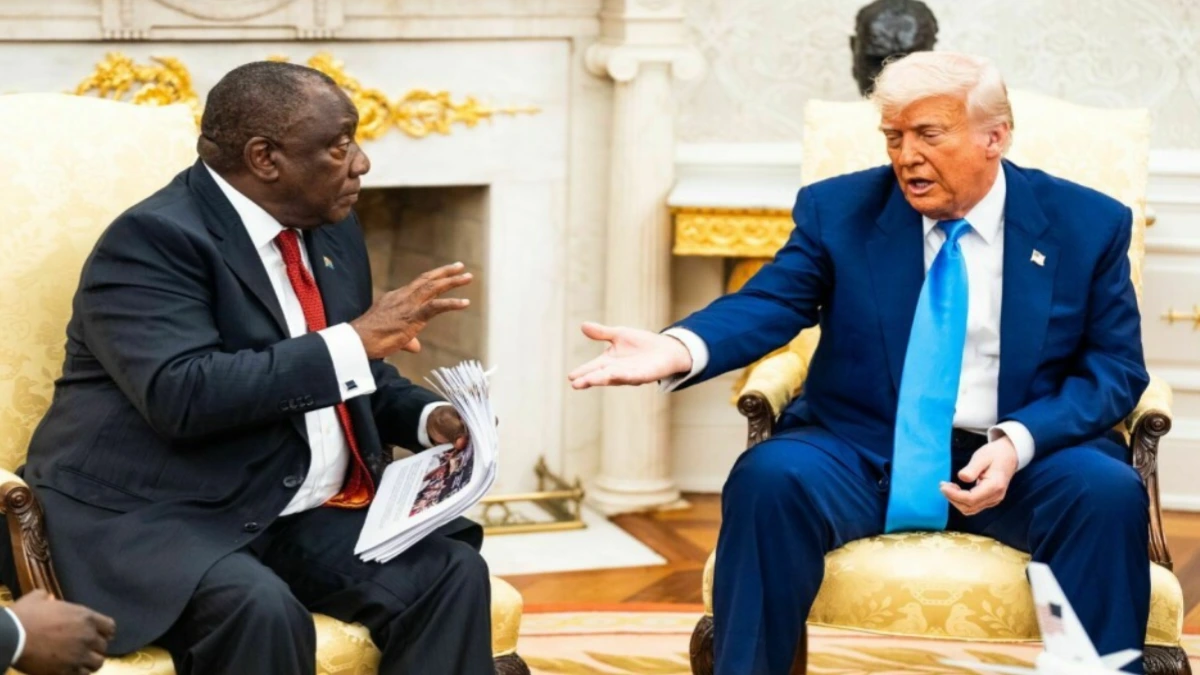WASHINGTON — President Donald Trump said Friday that no US government officials will attend this month’s Group of 20 summit in South Africa, citing what he described as “human rights abuses” against white Afrikaners.
The decision marks one of the most significant diplomatic snubs of a G20 host nation in recent history and underscores growing tensions between Washington and Pretoria.
“It is a total disgrace that the G20 will be held in South Africa,” Trump said in a post on Truth Social. “Afrikaners are being killed and slaughtered, and their land and farms are being illegally confiscated. No US Government Official will attend as long as these Human Rights abuses continue.”
South Africa’s foreign ministry called the announcement “regrettable” and rejected Trump’s claims as “unsubstantiated by fact.”
The G20 summit, set for November 22–23 in Johannesburg, is expected to draw leaders from major economies to discuss global trade, climate challenges, and conflict resolution. Vice President JD Vance had been slated to lead the US delegation before the abrupt reversal.
The US and South Africa have sparred in recent months over several foreign policy issues, including Pretoria’s lawsuit accusing Israel of genocide in Gaza and its longstanding ties with Russia and China.
Trump’s latest move follows his administration’s tightening of refugee admissions and remarks prioritizing white Afrikaners for entry to the United States.
The South African government, however, has repeatedly denied allegations that white farmers or Afrikaners face systemic persecution.
“The claim that this community faces persecution is not substantiated by fact,” the foreign ministry said in a statement. “South Africa’s history of racial inequality equips it to help the world bridge divides through the G20 platform.”
Analysts said the decision to boycott the summit could deepen diplomatic rifts and isolate the U.S. in global discussions on trade and development.
“Skipping the G20 in Johannesburg sends a symbolic but damaging message,” said Dr. Evelyn Mokoena, a political analyst at the University of the Witwatersrand. “It suggests Washington is willing to prioritize domestic political narratives over multilateral engagement.”
Former U.S. diplomat Richard Hall noted that Trump’s stance mirrors themes from his previous term, where nationalist rhetoric often shaped foreign policy.
“Trump has revived a narrative about South Africa that appeals to his political base but is out of step with diplomatic consensus,” Hall said. “Other G20 members, particularly in the Global South, are likely to see this as political theater rather than principle.”
According to South African Police Service data, farm attacks and murders have declined over the past decade, with 77 incidents reported in 2023 compared with more than 150 annually in the early 2000s.
Analysts emphasize that crime in South Africa affects communities across racial lines, not only white farmers. The US decision also places it at odds with other Western allies.
The European Union, United Kingdom, and Canada have confirmed full participation in the summit, emphasizing the importance of “open dialogue even amid disagreements.” Economically, the move may have limited immediate impact, but it risks long term diplomatic fallout.
South Africa is the continent’s most industrialized economy and a key member of the BRICS bloc alongside Brazil, Russia, India, and China nations that have sought to position themselves as a counterweight to US influence.
In Johannesburg, reactions to Trump’s remarks ranged from anger to resignation. “We’ve heard this before from him,” said Thandi Nkosi, a political science student at the University of Johannesburg.
“It’s frustrating because it misrepresents who we are as a country. South Africa isn’t perfect, but this kind of rhetoric hurts ordinary people, not politicians.”
In Pretoria, some Afrikaner community leaders welcomed Trump’s comments, saying they highlight long ignored rural safety concerns.
“Farm attacks are real, and they devastate families,” said Willem van der Merwe, a farmer from Free State province. “We don’t agree with all of Trump’s words, but at least someone is paying attention.”
Meanwhile, US based advocacy groups warned that Trump’s decision could undermine America’s leadership role in global governance.
“By walking away from the table, the US risks ceding influence to China and Russia,” said Lillian Barrett, director of the Global Democracy Initiative, a Washington think tank.
Diplomats said the US absence will not cancel the summit but could complicate multilateral discussions on trade, climate, and global security. G20 host South Africa has indicated that the meeting will proceed “with or without US representation.”
Trump also reiterated plans to host the 2026 G20 summit in Miami, a move that experts see as part of a broader effort to reshape the group’s agenda around his administration’s priorities. “He’s sending a message that future G20 meetings will align more closely with his worldview,” said Mokoena.
Observers believe Pretoria will seek to de-escalate tensions but remain firm in rejecting claims of racial persecution. “South Africa has always been proud of its constitutional democracy,” said Hall. “This dispute may flare up now, but both sides will need to find common ground in the months ahead.”
The US decision to boycott the G20 summit in South Africa underscores a widening rift between the two nations over human rights narratives and geopolitical alignment. While Trump framed the move as a stand against alleged abuses, South Africa dismissed his assertions as unfounded.
As global leaders prepare to meet in Johannesburg without American representation, questions linger over how the absence of one of the world’s largest economies might reshape the summit’s outcomes and signal the direction of US foreign policy heading into 2026.
